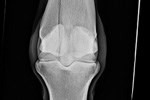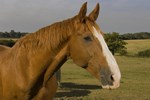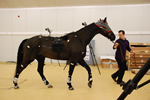Search - Research
41 - 50 of 429 results
-
Dr Debbie Guest wins the Petplan Charitable Trust Scientific Award 2022
The Petplan Charitable Trust Scientific Award was presented to Dr Debbie Guest at the recent annual Petplan Veterinary Awards in Manchester. The Award is given in recognition of an outstanding contribution to companion animal veterinary science. …The Petplan Charitable Trust Scientific Award was presented to Dr Debbie Guest at the recent annual …
-
New Thoroughbred genetic fracture risk scoring system developed by the RVC discovers collagen is contributing factor
New research from the Royal Veterinary College (RVC) into genetic risks of fracture in Thoroughbred horses has found that horses with lower levels of collagen type III have a higher risk of fracture. Previously, there has been limited research …New research from the Royal Veterinary College (RVC) into genetic risks of fracture in Thoroughbred …
-
RVC research discovers hippos' ability to become airborne
A new study from the Royal Veterinary College (RVC) into the movement and gaits of hippopotamuses on land has found that while they almost exclusively trot, the fastest-moving hippos become airborne for substantial periods of time. This research … -
Galloping isn’t such hard work for horses
For the first time, external mechanical work in galloping racehorses has been measured using force plates as ergometers. The results of this study, conducted by Royal Veterinary College (RVC) researchers in the Structure and Motion Laboratory, have … -
Improving antimicrobial stewardship: RVC research reveals extent of systemic antimicrobial usage in UK equine practice
To mark World Antimicrobial Awareness Week, the Royal Veterinary College (RVC) has released new research using real-world antimicrobial prescription data to investigate the use of systemic antimicrobials in UK equine practice. The research, which is …To mark World Antimicrobial Awareness Week, the Royal Veterinary College (RVC) has released new …
-
The launch of Equine VetCompass
We are excited to announce the launch of an exciting new project - Equine VetCompass. So far, since the start of VetCompass in 2009, our research has been primarily focused on small animal health and welfare, with data collected from small animal … -
New HBLB grant awarded to Prof Simon Priestnall and Dr Alejandro Suarez-Bonnet
Squamous cell carcinoma (SCC) is the second commonest equine tumour, predominantly affecting genitalia and the eyes/periorbital tissues. These tumours typically have a guarded to poor prognosis, and a significant proportion are likely induced by …Squamous cell carcinoma (SCC) is the second commonest equine tumour, predominantly affecting …
-
RVC research team is one step closer to objective detection of horses with ataxia
Researchers at the Royal Veterinary College have developed a method of objective evaluation that can help differentiate horses with ataxia, a neurological disorder resulting in an uncoordinated or drunken gait, from those with other mobility issues. -
Use of Systemic Antimicrobials in UK Equine Practice (Complete)
The project aims to investigate the use of systemic antimicrobials in UK equine practice using anonymised veterinary electronic patient record data. -
Open source bone biology software benefits industry and academia
Open source image analysis software BoneJ developed at RVC being used in volcanology, marine biology, soils science, battery design, and food science










